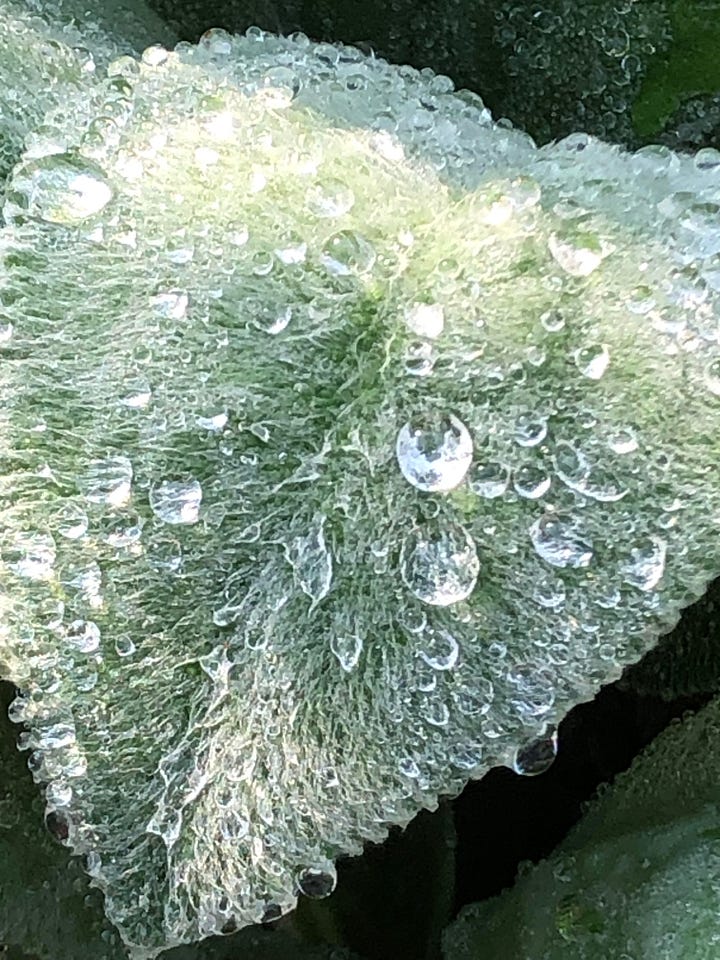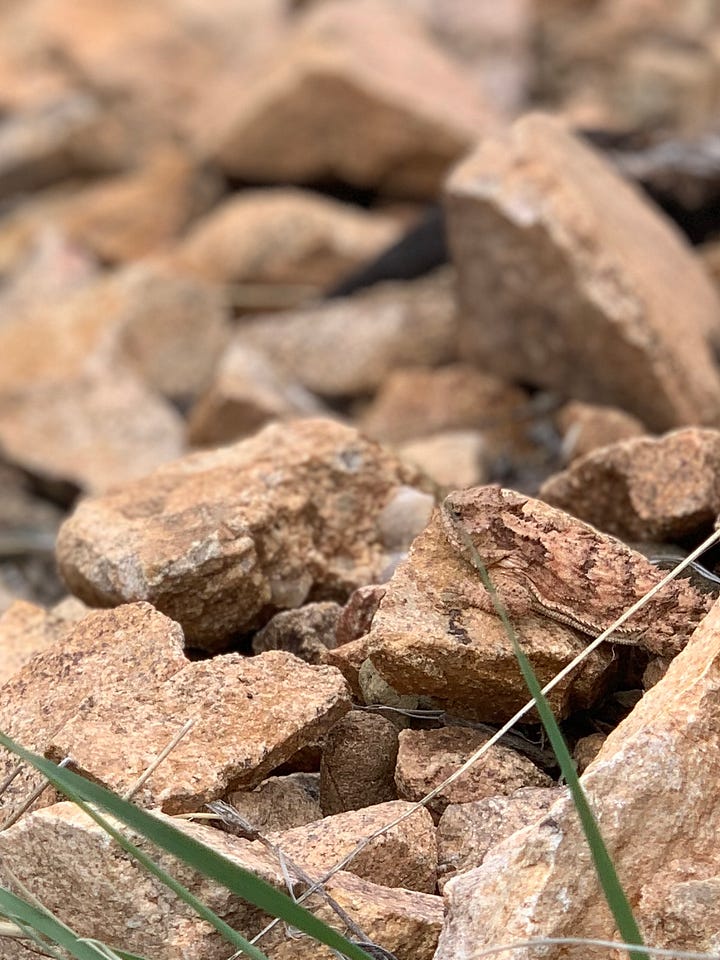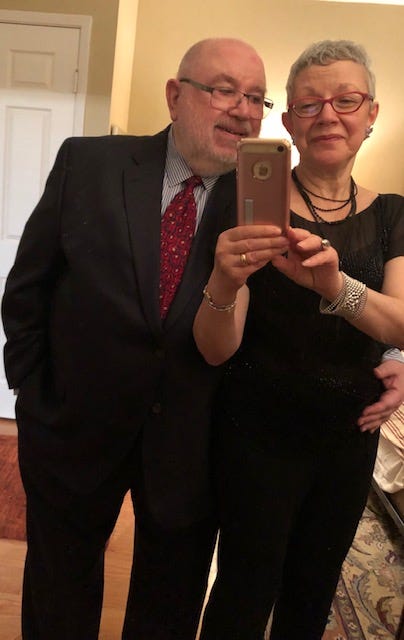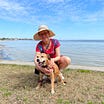

’s writing first caught my attention when Substack was but an itch in my fingertips. Poking around the platform, I stumbled onto a guest post she’d written for ’s Beyond, “I’m Nobody.” I knew immediately I wanted to read anything this woman had to write. So, I followed her on Facebook, enjoyed her posts there, put her on a list of writers to look up more about, and was thrilled when she launched Amazement Seeker. In comments on each other’s posts, I saw we had a fruitful, playful back-and-forth, an enjoyment of riffing on each other’s words. So, I knew when I thought of this collaboration with other writers I wanted to write with her and, mostly, that I wanted to share her with you.
What I didn’t yet know was how deep Rona’s writing clout ran (or I may have found myself intimidated). Rona served as the editor in chief of Chatelaine for a decade of its heyday (1994–2004), with a readership of 3 million. She’s the author of My Mother’s Daughter (2008) and Starter Dog (2023) and a contributing author to the New York Times bestseller Eye of My Heart. You can find her at Amazement Seeker. And you’ll be ever so glad you did. Her writing is seeking, often leads you to unexpected places, and full of lines that make you go, Ahhhhh. Today, our conversation loosely centered on home.
Rona on watching a frog breathe and raising her dead
HS. You’ve known a neighborhood in a way roaming hasn’t afforded me. And then along came a dog and changed that view: “I found home was bigger than I knew. It was every place I explored with Casey while heading nowhere in particular” (Starter Dog). What enabled you to follow the love of a dog to an expanded understanding of home?
RM. Before Casey I was purposeful to a fault. The world I moved through, the fastest person on the sidewalk, had to compete with the world inside my head. Casey forced me to slow down. While Casey did his doggish thing, I looked around. I watched two insects having a fight to the death. I discovered that earthworms, after rain, turn the colors of Monet’s water lilies. I knelt to watch a frog breathe. Casey became my portal to the natural world, and I found myself enthralled. Every time we headed out, I asked myself, “How will this walk be different from all other walks?” I took photos of the small marvels I found with Casey. Then I wrote about them in a series of Facebook posts that became the spine of Starter Dog.
I was a woman in love—not simply with my dog but with my corner of the world. Everywhere we went was home because we walked it, season after season. Casey loves meeting people, and in his company I did too. The people we met became my neighbors, from office workers on their lunch break to street people who loved dogs and couldn’t have their own. I learned to love shooting the breeze with strangers.
HS. During your ten-year tenure as editor-in-chief of Chatelaine, Canada’s iconic magazine for women, you took the magazine in a more personal direction, focusing on the struggles of everyday women—to a volley of grateful replies. What led you to steer in that unexpected direction?
RM. Magazines were in their glory then, and Chatelaine reached one in four Canadian women. We’re talking 1994–2004, before people moved their entire lives online. I sensed a longing in our readers to enter into one another’s emotional worlds, to learn and grow through the sharing of personal stories. Facebook and Substack were unimaginable then. If women were looking for the truth about women’s lives, they came to Chatelaine. I took the job expecting that my column would address burning issues, but that’s not what our readers wanted most from me. They related to the stories I told about mourning the death of my mother, raising my son, delighting in my city on the morning walk to work. Everything I do in Amazement Seeker goes back to that column.
HS. In “Raising the Dead,” a piece you wrote for Brevity, you wrote of Val, a dear friend you lost unexpectedly. In My Mother’s Daughter (a copy of which just arrived in my mailbox!), you say your mother gave birth to you a second time on her deathbed. How does remembering those who’ve formed you inform your writing home?
RM. I mostly like growing older; the hardest part is losing people. There’s no replacing the friends who formed you, who remember things about you that fell out of your own memory bank long ago. At 74, I have years and years to look back on, and moments that seemed inconsequential at the time have acquired a shimmer that borders on reverence. I notice people’s gifts, their charm, their enthusiasm as I didn’t when we were young together. As a writer, I get to raise my dead. They become so real in the writing, I can see them, hear them, practically touch them. It’s a joy and a thrill while it lasts. If I can’t keep these people with me, I’ll settle for the next best thing: honoring the difference they’ve made.
Holly on a gas station bathtub and finding out
RM. Wherever you go, you meet people who are real to your readers—the Flips and Roses and Jills of this world, not to mention the Bible-reading guy fresh out of jail, your seatmate on a Greyhound bus. And there’s your editor at the paper in West Virginia, whom you recall with compassion even though he killed your column on same-sex marriage. You write about him with love for his good intentions and for the entire community. Although you don’t have my notion of physical roots, people seem to root you on your wanderings. So I have to ask: What’s your concept of neighborhood? Can you find it wherever you happen to be at the moment, even if the values of that place don't match your own?
HS. I can. Neighborhoods of friends and family are old friends. My favorite gas station (it offers shower rooms with bathtubs!) is in Flagstaff, AZ. There’s a gulch I love to explore in northern Washington, a thrift store I hit up every time I roll through Joshua Tree, CA. I should tell you about Jaxon, a lanky red paper wasp who visited my Sonoran Desert campsite daily in early 2020, along with Bart, a horny toad, who I’d often find, still as time, under a flat rock securing my awning. They and a chorus of birds were my neighbors for a period of solitude.
I’m guided by a quote by Roman playwright Terence: I am human, so nothing human is alien to me. Once, I was sipping coffee with a guy I’d been camped next to for a couple nights. The tide rolled out, and a mostly blind albino Great Dane frolicked on the rocky shore. Apropos of nothing except, I’m assuming, signs in Ruby the van’s window, he asked, “Do you think we’re racist just because we’re white?” A nuanced conversation ensued. No hearts or minds were changed. But maybe a tiny piece of a one-day bridge was exchanged. I do struggle with compassion when people’s values put up roadblocks to others’ well-being.
RM. I ask myself of every new writer I read, “Is anybody home?” I like to sense a unique human inviting me into a space I can see and feel. You have a gift for this, and it shines in your piece on Ruby van Jangles. “When the wind blows, my entire world rocks.” What would it take to get you out of the van and into more conventional quarters? Is it now impossible for you to imagine living in a house or an apartment?
HS. It’s not impossible for me to imagine living anywhere. I think I was born with an insatiable desire for experience. I could imagine living on a boat; in a tree; along a path trekking nearly anywhere on this vast, tiny planet we share; and yes, in a house or apartment. If you’re reading and have an interesting living situation I might try out, let me know.
A new health challenge has me in a liminal space. I’m out of the van for the moment (my “stuff” remains on Ruby’s shelves, but I lay my head elsewhere). My body is signaling there was a before, and there’ll be an after. I’ve sort of had a diagnosis (I wrote about it here), but complications have arisen to suggest it may be something else (as well). So, my metaphorical quarters are a portal of finding out.

Rona on love and cross-generational friendships
HS. I was just about to ask how 54 years of marriage has made you and Paul each other’s homes of the heart when you posted, “How Do You Know You’re in Love?” So, I’ll build on the question. You wrote in Starter Dog of Paul’s proposal to rescue a dog, “Since I couldn’t figure out what I wanted for myself, I might as well get behind what my husband wanted. Let his wanting lift me like a trailing scarf on a breeze.” How has your sense of a shared home for the heart played a role in maintaining your selfhood, in choosing when to lift and be lifted?
RM. I moved directly from campus housing to my first walk-up apartment with Paul. At 20 and 21, we’d known each other about three months and would be accidental parents at age 22. On the face of it, none of this made sense. We fought relentlessly about everything from household chores to political issues. Any difference of opinion or habit seemed potentially lethal to the relationship. Most dangerous of all, he didn’t love everything about me. He found me judgmental and hidebound.
Although he’d been in love a few times before, love was new to me and I had more illusions than he did. Side by side, we came to understand that mature love is seeing your partner clearly, the crazy-making side along with the endearing one, and loving that person anyway. You haven’t realized the potential of love if you’re trying to change the other person, or change his assessment of you. We are what we do and how we treat each other, not who we say we are.
Kindness is the wellspring of trust, and when we didn’t entirely trust each other, it was largely because we hadn’t learned to be kind. I grew as a person and as a partner when it finally dawned upon me that if Paul really, fervently wanted to make something happen, maybe I should give it a go. He is the “let’s do it” one; I’m the one who asks, “What can go wrong?” But if not for Paul’s fervent desire to try new things, we would not have Casey the rescue mutt, who inspired my second book. Paul had always wanted a dog, and I didn’t have the heart to say no.
HS. Am I reading in too much to see the “ghosts of children never had” in your work now and again? You mention a girl who’d have been your daughter’s age if you’d had one, meet a man and think, If I had a struggling musician son … How has choosing not to have a second child shaped your life?
RM. How observant you are. I used to think I’d have a second child and was hoping for a daughter. In my mind, she’d love the books I loved as a child and go to the ballet with me. It didn’t cross my mind that she might be mad about soccer or horses—or that “she” might be a son. My son’s birth, when we were 22, nearly shattered our marriage and plunged me into depression. By the time I felt emotionally ready for another child, Ben was already 12.
I wasn’t up for the challenge of an infant and an adolescent at the same time, so I closed the door on my second child. She’d be in her late 30s now, and I often feel a surge of tenderness for appealing young women around that age. It’s a small sadness I carry, although it may ebb as I make younger friends. At my age, it’s increasingly important to look beyond your generational walls. This probably comes naturally to you, given your vagabond lifestyle. For me it’s a new survival skill. The best part of growing older is the capacity to be mindful about the empty spaces in your life. Since you can’t fill them with what was, you look at what might be.


Holly on opening jars and reconnection
RM. As one who's never lived alone, I think of you as my polar opposite—managing whatever comes up, wherever you are, on your own. If I outlive my husband, I’ll probably never watch Netflix or get another jar open. So I’d love to know your take on the best and worst things about living alone.
HS. Ha! I couldn’t wait to answer this question, primarily to tell you I’ve stood on a sidewalk or paced a campsite in search of a passerby to open a jar. I like to think myself strong and capable, but my wrists don’t always comply. As for managing whatever comes up, I must say a string of friends and strangers have added a knot whenever the thread that holds the kite of my life has started to fray.
The best and worst things about living alone, I’ll answer in the same way:
You are entirely led by your own curiosity and desire to see and learn and do something new.
The responsibility for and outcome of all decision making is yours and yours alone.
The truth is I believe we humans are relational creatures. I long to evolve alongside a long-term partner, to weep for joy and anguish while held in the heart of someone who I’ve come to know and who has come to know me by deciding we’ll go forth on this experiment called life together. And I believe we’re creatures of solitude—that it does us good to know ourselves, to be home to ourselves. I’m grateful to know myself in the way flying solo for many years has enabled.
RM. You wrote in "Of Bears and Ants" about giving up “the carob-haired girl," a daughter born when you were a teen. How has that shaped your creative life? We all live with might-have-beens; this is one of yours. Yet it seems you knew early that motherhood was not for you. Let’s explore that decision and its consequences.
HS. I didn’t actually know early that motherhood wasn’t for me. While I felt certain the child I gave birth to shortly after turning eighteen would be better off without a mother who was still virtually a child, I thought for many years I’d one day “be ready.”
Giving up the carob-haired girl (who, since her eighteenth birthday twelve years ago has been an intricate part of my life) has shaped me. For a long time, I felt obligated to “make good on my life” for her sake—to mold myself into someone she’d be proud of. That I’d already done the disappointing I longed to avoid, in leaving in the first place, and already had within me the only thing she’d ever need from me, my undying love, came to me in a flood of relief upon our reuniting.
She’s among my favorite people on this planet. Our connection has opened up my creative life, just as it has opened me. (She’s a crazy talented artist and does all the graphic design and artwork for my stack, btw.)
Want more of Rona? I don’t blame you! Check out Amazement Seeker.
This collab is the fourth in a series called 5x5. Discovering brilliant minds, hearts, and voices has long been a love of mine. The ease of connecting with writers whose work I love on Substack is magic. Can’t wait to share more writers I love and think you may love too. If you think we should get a 5x5 on—writer or not, Substacker or not—let me know by hitting me up here.









Such a delight to collaborate with you, Holly.
Thanks for this dialogue Holly and Rona.
"As a writer, I get to raise my dead." That sentence's remarkable power rests upon the word "my."